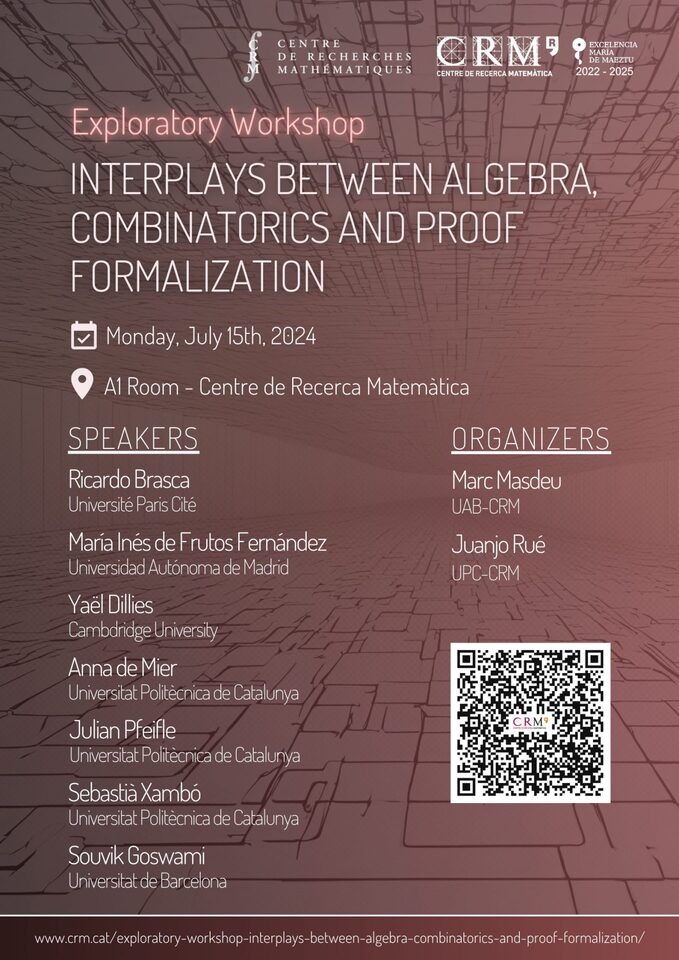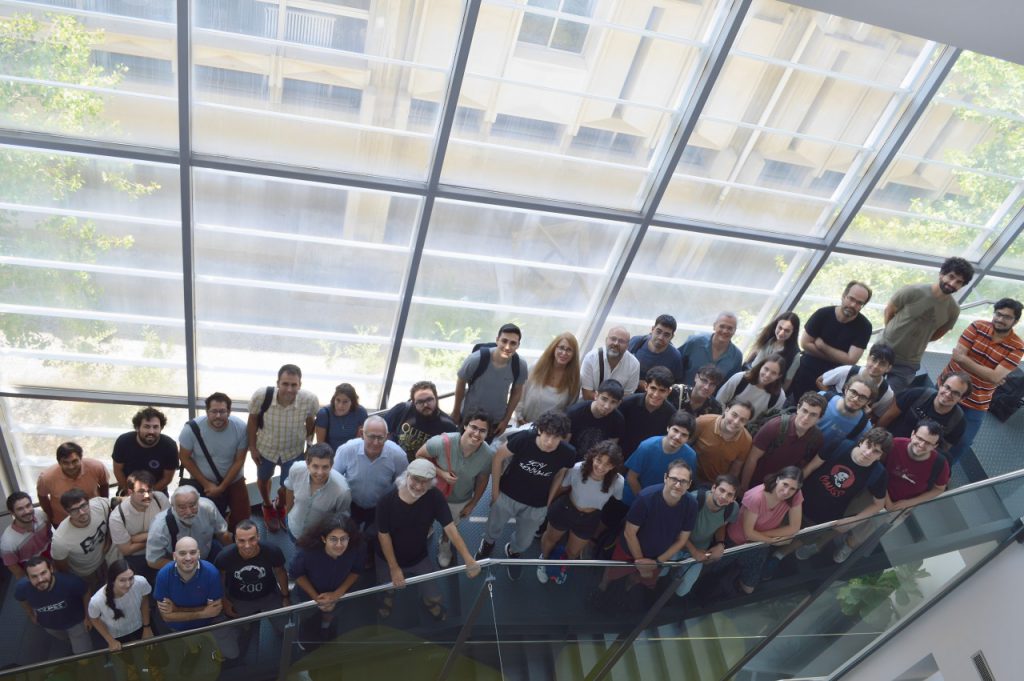

CRM Exploratory Workshop
Sign in- Room: A1 (CRM)
- Dates: 15th of July, 2024
Registration for the activity is free but mandatory.
Registered participants from CRM-MONTREAL will receive the zoom link to follow the afternoon sessions by July 12, 2024.
Since the seminal works of the MIT professors Gian-Carlo Rota in the 1960’s, and later Richard Stanley, combinatorics has become an important branch of modern mathematics where interplay of different areas arise. In particular, the Rota-Hero-Welsh’s Conjecture, proposed by Gian-Carlo Rota in the 1960s for graphs and later by Hero and Welsh for matroids, has long stood as one of the most tantalizing problems in combinatorics and algebraic geometry. It posited a deep connection between the combinatorial structure of matroids and the algebraic structure of projective varieties. Specifically, it conjectured that certain relations, now known as the Hodge Riemann relations, hold true for the intersection numbers of divisors on a projective variety defined by the matroid. Despite decades of effort from mathematicians around the world, the conjecture remained stubbornly unresolved, serving as a formidable challenge at the intersection of these two fields.
June Huh’s initial breakthrough came with his groundbreaking proof of Rota’s Conjecture [1], achieved through a novel synthesis of techniques from algebraic geometry, combinatorics, and homological algebra. His work unveiled the intricate connections between combinatorial objects such as matroids and algebraic varieties, providing a deep understanding of the underlying structures governing their intersection. Through meticulous analysis and innovative reasoning, Huh demonstrated that the Hodge Riemann relations indeed hold true, thereby resolving a decades-old mystery and opening up new avenues for exploration in combinatorial algebraic geometry.
Subsequently, Huh’s collaboration with Karim Adiprasito and Eric Katz [2] further illuminated the rich mathematical landscape that emerged from their initial breakthrough. Together, they delved into the study of positivity for matroids and polytopes, uncovering deep connections between combinatorial structures and algebraic geometry. Their research yielded not only elegant proofs of fundamental results but also novel mathematical objects that bridge the gap between discrete and continuous mathematics. Through their collaborative efforts, they uncovered new perspectives on toric varieties, matroid theory, and tropical geometry, among other areas.
On another direction it has become nowadays more and more popular formal logic systems used to formalize mathematical proofs. In this context, LEAN is getting more and more popular due to its is versatile, allowing for a wide range of applications and uses. This tool is growing day by day and we believe it would be good to show to a wide mathematical audience the state of the art of this tool.
Session 1 | Morning
An Introduction to Matroid Theory
Abstract: Matroids originated in the 1930’s as an abstraction of the notion of linear independence in vector spaces. Whereas matrices and graphs provide the first examples and were the motivation for the developing of the field, matroid theory has many connections to other areas, such as matchings, optimization, geometry or criptography. In this talk we will give an overview of matroids, focusing on those aspects that justify their alternative name, albeit not so common, of combinatorial (pre)geometries.
One special feature of matroids is that they have several equivalent definitions. We will go over the main ones (bases, indepedents sets, flats, rank, circuits…), and then we will survey the basic operations (minors and duality) and present some important classes of matroids. We will then move to matroid polynomials, with an emphasis on the characteristic polynomial and its properties.
No previous knowledge of matroid theory will be assumed.
Anna de Mier
Universitat Politècnica de Catalunya
SLIDES
Matroid polytopes, tropical geometry, and log-concavity
Abstract: We continue the previous talk and examine some geometric incarnations of a matroid M, namely matroid polytopes, Bergman fans, and tropical linear spaces. More algebraically, the rational cohomology of the complement of a certain hyperplane arrangement associated to M is called the Orlik-Solomon algebra, whose Poincaré polynomial is related to the characteristic polynomial of M.
We hope that these examples will build some intuition for understanding the essence of Huh–Adiprasito–Katz’s proof of the log-concavity of the coefficients of this characteristic polynomial, namely that the tropical variety or Bergman fan associated to a matroid has the structure of the cohomology ring of a smooth projective variety.
Julian Pfeifle
Universitat Politècnica de Catalunya
SLIDES
Survey of Chow groups
Abstract:
The study of algebraic cycles is at the cornerstone of Algebraic Geometry, and shares common ground with Arithmetic Geometry, Algebraic K-theory, and Analytic geometry. The definition of the free group of algebraic cycles is easy to understand, and can be generalized to different categories. The non-trivial part is to define a suitable equivalence relation, so that the quotient group becomes equipped with a ring structure. Such an equivalence relation is provided by rational functions on subvarieties, and the resultant quotient is defined as the Chow group attached to an algebraic variety.
The purpose of this talk is to give an introduction and survey of this topic. More aligned towards the topic of this conference, I will introduce Chow group of a matroid.
Souvik Goswami
Universitat de Barcelona
SLIDES
Kähler packages and their combinatorial significance
Sebastià Xambó
Universitat Politècnica de Catalunya
SLIDES
Session 2 | Afternoon
Algebra in the Lean mathematical library
Abstract: We will start by introducing the interactive theorem prover Lean and its mathematical library Mathlib. We will next give an overview of the algebra hierarchy in the Mathlib library (how groups, rings, modules, etc. are formalized, and the dependencies between these objects). Finally, we will discuss the formalizations of several topics that appear in Huh’s work, including polynomial rings and graded algebras.
María Inés de Frutos Fernández
Universidad Autónoma de Madrid
Combinatorics in Mathlib and beyond
Abstract: As the main Lean library of mathematics, Mathlib acquires new formalisations at an increasing pace. Curiously, one area of mathematics is lagging behind: combinatorics.
I will first present the combinatorics that Mathlib does have (basic graph theory, the regularity lemma, set families) before touring significant projects outside of Mathlib (discrete Fourier analysis, matroid theory, linear programming). Finally, I will offer some explanations on why Mathlib is so poor at incorporating combinatorics formalisations and how you can help.
Yaël Dillies
University of Cambridge
Geometry in mathlib
Riccardo Brasca
Université Paris Cité
 | MONDAY July 15th |
9:15 9:30 | REGISTRATION |
9:30 10:15 | Matroids Anna de Mier Universitat Politècnica de Catalunya |
10:20 11:05 | Polytopes Julian Pfeifle Universitat Politècnica de Catalunya |
11:10 11:40 | COFFEE BREAK |
11:40 12:25 | Cohomology Souvik Goswami Universitat de Barcelona |
12:30 13:15 | Kähler packages and their combinatorial significance Sebastià Xambó Universitat Politècnica de Catalunya |
13:15 15:30 | LUNCH |
15:30 16:30 | Algebra in Lean María Inés de Frutos Fernández Universidad Autónoma de Madrid |
16:35 17:35 | Combinatorics in Lean Yaël Dillies University of Cambridge |
17:35 18:15 | COFFEE BREAK |
18:15 19:15 | Geometry in Lean Riccardo Brasca Université Paris Cité |
| Name | Institution |
|---|---|
| Martí Parés Baraldés | |
| Tarun Dalal | ShanghaiTech University |
| Eloi Torrents | RunCall Systems |
| Hugh Thomas | Université du Québec à Montréal |
| Ryan Kavanagh | Université du Québec à Montréal |
| Vicent Navarro Arroyo | Universitat de Barcelona |
| Biel Barberà Collado | Universitat de Barcelona |
| Pablo José Galante Campoy | Universitat de Barcelona |
| Àlex Martín | Universitat Autònoma de Barcelona |
| Tomàs Planelles Alonso | Universitat Autònoma de Barcelona |
| Jordi Cardiel | Universitat Autònoma de Barcelona |
| Guillem Mata Carmona | Universitat Autònoma de Barcelona |
| Laura Valencia Germán | Universitat Autònoma de Barcelona |
| Marina Fernández Vilaseca | Universitat Autònoma de Barcelona |
| Huaxin Ou | Universitat Autònoma de Barcelona |
| Xavier Xarles | Universitat Autònoma de Barcelona |
| Marc Noy Serrano | Universitat Politècnica de Catalunya |
| Edgar Moreno | Universitat Politècnica de Catalunya |
| Sebastian Xambó Descamps | Universitat Politècnica de Catalunya |
| Patrick Morris | Universitat Politècnica de Catalunya |
| Jordi Saludes | Universitat Politècnica de Catalunya |
| Guillem Perarnau Llobet | Universitat Politècnica de Catalunya |
| Juan Jose Rue Perna | Universitat Politècnica de Catalunya |
| Xavier Povill | Universitat Politècnica de Catalunya |
| Luis Gutiérrez Garrido | Universitat Politècnica de Catalunya |
| Joan Pascual Ribes | Universitat Politècnica de Catalunya |
| Lluis Vena Cros | Universitat Politècnica de Catalunya |
| Lídia Rossell Rodríguez | Universitat Politècnica de Catalunya |
| Frank William Hammond Espinosa | Universitat Politècnica de Catalunya |
| Roger Lidón Ardanuy | Universitat Politècnica de Catalunya |
| Darío Martínez Ramírez | Universitat Politècnica de Catalunya |
| Oriol Farràs | Universitat Rovira i Virgili |
| Adriana Moya | Universitat Rovira i Virgili |
| Tomás Coronado | Universitat de Les Illes Balears |
| Gabriel Riera Roca | Universitat de Les Illes Balears |
| Pau Vives López | Universitat de Les Illes Balears |
| Jaime Riesgo Pardo | Universidad de Oviedo |
| Juan Mardomingo Sanz | Universidad de Valladolid |
| Ismael El Yassini | University of Waterloo |
| Adrien Segovia | University of Québec at Montreal |
| Antonio Luis Dias Caceres | Aalborg University |
| Fatemeh keivani | Aalto University |
| Deniz Demirer | University of Paris-Sud |
| Monica Garcia | Versailles Saint-Quentin-en-Yvelines University |
| Zareen Hyatt | Durham University |
| Maria Esteban Casadevall | Heriot-Watt University |
| Tássio Naia | Centre de Recerca Matemàtica |
UPF | UB | UPC | UAB
Paying by credit card
ON-CAMPUS AND BELLATERRA
BARCELONA AND OFF-CAMPUS
|
For inquiries about this event please contact the Scientific Events Coordinator Ms. Núria Hernández at nhernandez@crm.cat
|



